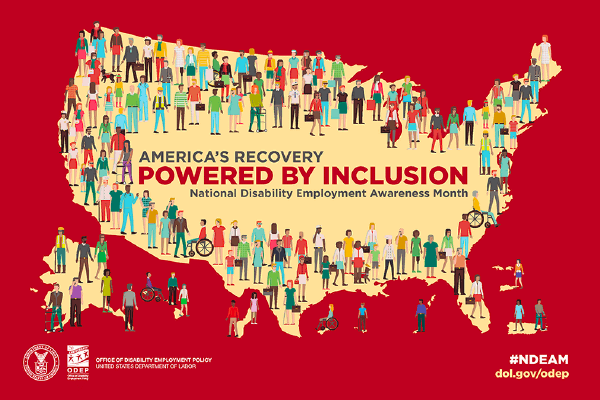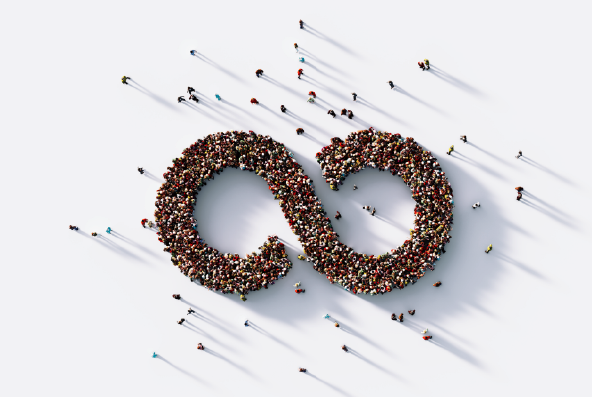National Disability Employment Awareness Month is recognized each October, with Disability Mentoring Day on the 20th. The week of the 17th is also recognized as Invisible Disabilities Week.
The theme for this year’s National Disability Employment Awareness Month (NDEAM) is “America’s Recovery: Powered by Inclusion.” Observed for 75 years, NDEAM is “an annual awareness campaign that takes place each October and celebrates the contributions of workers with disabilities and educates them about the value of a diverse workforce inclusive of their skills and talents,” as noted by the American Bar Association, which is inviting legal employers to sign the Pledge for Change:
Throughout the month, lawyers with disabilities and disability rights advocates will share their thoughts on this year’s theme. The ABA’s Commission on Disability Rights (CDR) invites legal employers to promote this year’s theme by joining our 200 signatories—corporations, law firms, law schools, municipalities, judiciaries, and nonprofit organizations that have pledged to increase disability diversity throughout the legal profession—and signing our Pledge for Change: Disability Diversity in the Workplace. Signatories are encouraged to share their stories about how signing the Pledge has increased disability awareness and inclusion in their law firm, which CDR will feature on our website.
The ABA has shared related resources, including:
- Why Hire People with Disabilities?
- Inclusive Technology: Enabling Accessibility at Work and in Our Digital Lives
- Beyond NDEAM: Year-Round Employer Strategies for Advancing Disability Inclusion
- Primer on Disability Inclusion (EARN)
- Business Strategies that Work: A Framework for Disability Inclusion
- 2019 Report on Diversity in U.S. Law Firms (NALP)
- People with Disabilities: Driving Innovation in the Workplace
- Diversity & Inclusion in the American Legal Profession: Workplace Accommodations for Lawyers with Disabilities
Noting that each of us is just one illness or accident away from acquiring disability, particularly in a time with long-haul Covid affecting as many as half its patients, Mary Connelly, Esq. shares considerations for Shifting Perspective on Disability for Inclusion in the Legal Profession in a guest post published on our blog last year. She offers concrete examples, including: “As one example, October is National Disability Employment Awareness Month (NDEAM), and within NDEAM, Disability Mentoring Day could provide you with an opportunity to make a difference. If you are interested in learning more about ways in which your law practice can support NDEAM and Disability Mentoring Day, please reach out to Mass Office on Disability[1] for guidance. You could also attend open meetings of your municipality’s Disability Commission and offer suggestions about how your municipality can advance its access and inclusion agenda.”
DISABILITY MENTORING DAY: OCTOBER 20, 2021
While we encourage lawyers not to restrict their work to annual days, weeks, or months of observance, no one should hesitate to start small — it helps build commitment. Work to make mentorship more accessible for lawyers in Massachusetts has been started by the Massachusetts SJC Standing Committee on Lawyer Well-Being — find their Mentorship Database for Massachusetts Lawyers here. First held in 2001, Disability Mentoring Day is an international event hosted by the American Association of People with Disabilities (AAPD) in collaboration with the Office of Disability Employment Policy (ODEP), hosted on the 3rd Wednesday as part of NDEAM each October. More information about participating is available on the Disability Mentoring Day website.
Invisible Disabilities Week: Oct 17 – 23, 2021
Noting that we need to talk about invisible disabilities to create opportunities for helpful dialogue, the Invisible Disabilities Association began hosting Invisible Disabilities Week in 2014. Find ways to participate here. As the organization explains on its website:
Unfortunately, people often judge others by what they see and conclude a person can or cannot do something by the way they look. This attitude can be equally frustrating for those who may appear unable but are perfectly capable, as well as those who seem able, but are not.
International Disability expert, Joni Eareckson Tada, explained it well when she told someone living with debilitating fatigue, “People have such high expectations of folks like you [with invisible disabilities], like, ‘come on, get your act together.’ But they have such low expectations of folks like me in wheelchairs, as though the thought is that we can’t do much.”
The bottom line is that everyone with a disability is different, with varying challenges and needs, as well as abilities and attributes. Thus, we all should learn to listen with our ears instead of judging with our eyes. That is the reason we define invisible disability.
FREE ABA WEBINAR
Live Event Hosted Monday, October 18th at 1pm
For the past two years, employers across the nation have moved with unprecedented speed to adapt to the COVID-19 pandemic, developing remote work policies and conducting interviews, onboarding, trainings, meetings, conferences, and other business virtually. As more employees are being asked to return to work, the question arises as to what that “return” looks like, particularly for disabled lawyers. What lessons have legal employers learned in rethinking the “office” environment? How can they apply these lessons to make the workplace more welcoming, accessible, and inclusive for disabled individuals? Will employers now allow all employees to telework more days and have flexible schedules? Will there be an increase in accommodations requests to telework exclusively and work a flexible schedule? Will law firm life look different as a result? In celebration of this year’s National Disability Employment Awareness Month theme, “America’s Recovery: Powered By Inclusion,” our esteemed panel of legal employers and disabled lawyers will share their experiences and tackle these and more questions.
Speakers include:
- Lindsay Callantine – National Director of Legal Recruiting, Seyfarth Shaw LLP
- Joanne Christopher – Senior Human Resource Manager, Reed Smith LLP
- Anat Maytal – Associate, BakerHostetler
- Calandra S. McCool – Associate, Big Fire Law & Policy Group LLP
Related Resources:
Massachusetts Office on Disability
ABA Commission on Disability Rights
Disability Rights Bar Association
Study: Disabled, LGBTQ+ Lawyers Face Discrimination (ABA News, 2020)
Transitioning Reasonable Accommodations from Law School to the Workplace (LCL MA Blog, 2020)
Interested in Forming a Group?
Anyone in the Massachusetts legal profession interested in forming a (Free & Confidential) group of any kind (e.g. disability) exclusively for Massachusetts lawyers, law students, and judges can let us know — many of our groups have been started by community suggestion. Reach out to rachel@lclma.org. Find more here on our current LCL MA Groups.
Free & Confidential Consultations:
Lawyers, law students, and judges in Massachusetts can discuss concerns with a licensed therapist, law practice advisor, or both. Find more on scheduling here.




